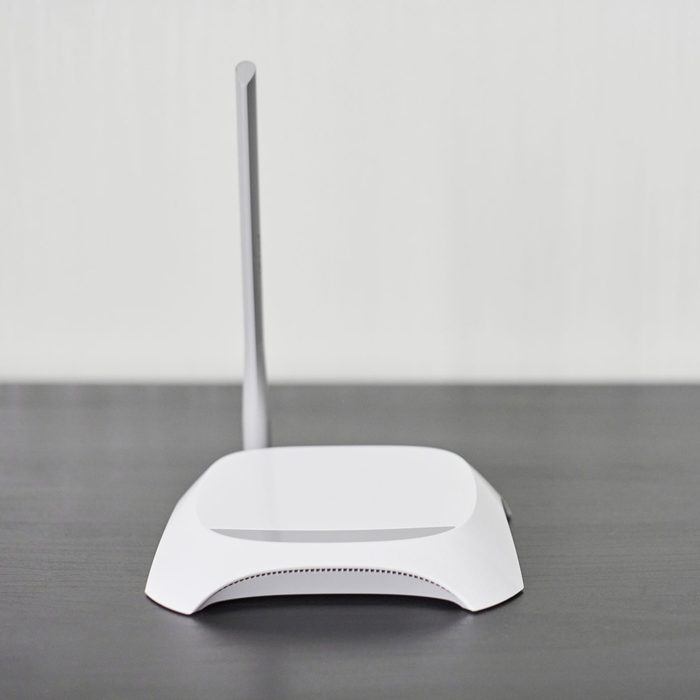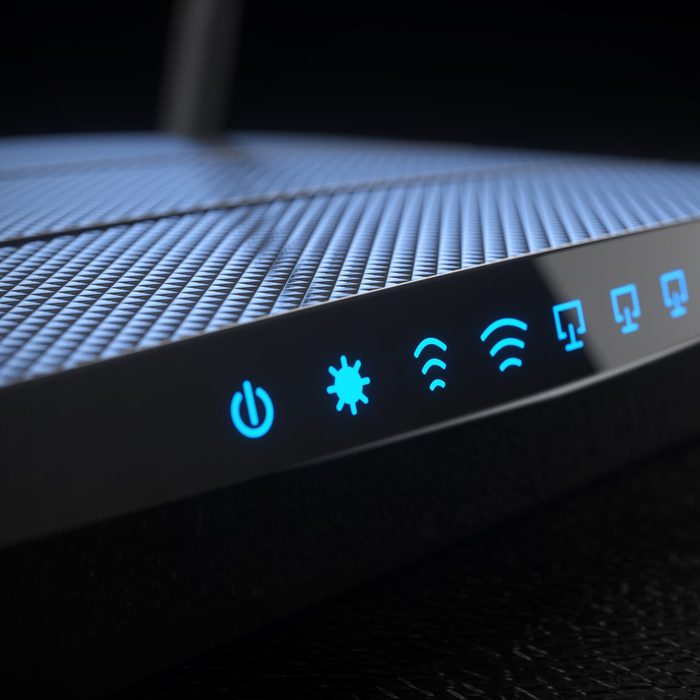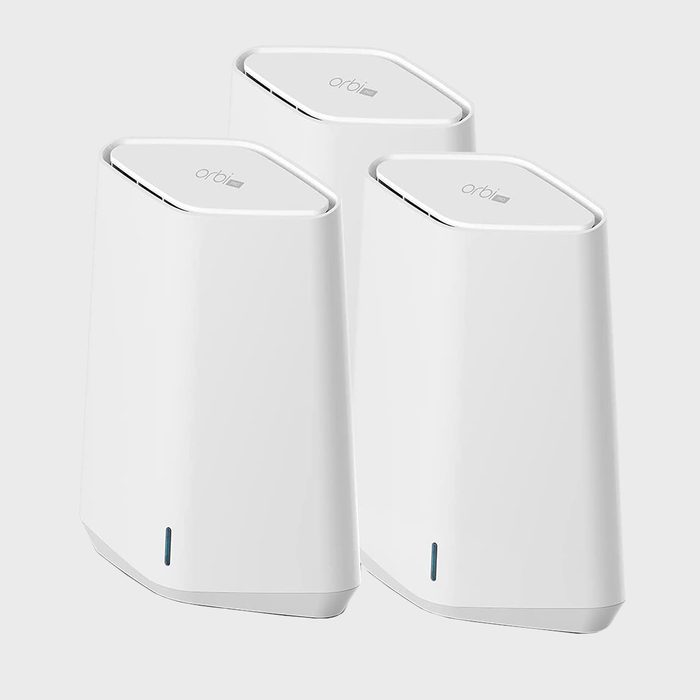
Do you often find internet dead zones in your home? Those frustrating WiFi drops could spell the difference between a productive day at work and a frustrating inability to get anything done. And forget about spending time on your favorite websites.
No matter whether you’re working or playing, you want a reliable, quick internet connection throughout your home. That’s where a mesh router can help.
A mesh router improves areas of low or no connectivity. It’s a great choice for larger homes and apartments, or anywhere with thicker walls, an odd layout or an inherently low WiFi signal.
Setting up a modern mesh system is easy, and you’ll have a quick, dependable internet connection as long you need it. No more drops. No more howling when your Google Docs sheet doesn’t save automatically because you fell offline.
Plus, a mesh router helps the internet run faster in your home. Besides giving you a robust new network, you might find one of the hidden reasons your internet is so slow. But what is a mesh router, anyway, and what is it for? We’ve got you covered. Take it from this tech editor: You’ll never go back to a regular network.
What is a Mesh Router?
You may be wondering: “Do I need a new router?” Think of a traditional router as a traffic circle. Data flows around to different devices located in different areas in your house. Everything has to come back to the circle before it can go somewhere else.
A mesh router is more like a standard road grid. Each four-way stop is a mesh router node that sends data to any other node within range. So, unlike WiFi extenders, mesh routers create overlapping network coverage that is more reliable and provides more routes for data to travel along. If you’re looking to make your WiFi faster, a mesh network may help with that as well.
Here are some other commonly-asked questions about mesh routers.
- Does your home need a mesh router? If it’s big enough, yes. You only see the real benefits (increased network stability and stronger signals) in larger homes if you create the mesh, with the coverage of two or more nodes overlapping. Setting the primary node in the middle of your house and secondary nodes on opposite ends is no different than using WiFi extenders.
- What happens if one of the nodes fails? Each mesh network has a primary node connected to the modem, along with secondary nodes. As long as the primary node remains operational, the secondary nodes will function. That’s why it’s essential to overlap nodes so that when one fails, the others can pick up its slack.
- Are mesh routers easy to set up? Brands differ, and some are harder to set up than others. The challenge is finding suitable sites for each node, which we’ll cover in a moment. Most mesh routers can be set up via an app on an Android or iOS device, with simple instructions and plenty of diagrams to follow. That makes it easy.
- Where should I place each mesh router? A WiFi signal expands from a router in the shape of a sphere. Make sure you place each mesh router within range of another one. However, the sphere won’t be uniform. Walls and floors lower its range. So even if a mesh router says it can cover 2,000 square feet, every barrier between a device and a router lowers that range.
- How many mesh routers do I need? Most come in packs of two or three, the minimum to get started. However, depending on the size of your house, it might be best to use five or more. In a 2,500 to 3,000 square foot home, one router in each corner and one in the center would create an excellent overlapping mesh network. Different construction materials and layouts can affect coverage, so you’ll need to experiment to find the best solution for your home.
- Are mesh routers worth the price? Cost is one of the major downsides. Expect mesh router packs to roughly match the cost of two traditional routers with similar specs. Some systems allow you to purchase beacons that are less versatile but cheaper to increase network range. However, they can’t be used as a primary node. Mesh routers are worth the price if you have connectivity issues in multiple parts of your home and want an easy way to get a stable, fast, expandable network. However, if just a single room has WiFi issues, it might be more cost-effective to go with an extender paired with a traditional router.
- Will all my devices work with a mesh router? yes. Mesh routers support the same 2.4GHz and 5.2GHz standards traditional routers do. Some models also support WiFi 6, which means compatible devices will get even faster network speed.
- Are mesh routers more or less secure than traditional routers? Network security is a growing concern for many consumers. One might think a mesh network is less secure due to its multiple entry points. However, that’s not the case. Mesh routers are just as secure as traditional routers and utilize the same WPA2 encryption (and WPA3 optionally for WiFi 6 connections) when connecting. And most mesh routers offer built-in security solutions to protect against unwanted intruders and malicious websites.

How a Tech Editor Shops for Mesh Routers
One of the most important features for me as a tech editor is whether the router is powerful enough to handle all my devices. In my home, I’ve always got plenty of gadgets hooked up and running simultaneously. Sometimes I want to play on my Xbox Series X and scroll through Pinterest! It’s got to be able to handle everything.
- Price: Mesh routers tend to be expensive, so, like you, I want the best value.
- Range: If I’m buying a three-pack of mesh routers that can’t cover my whole home, I’ll need to purchase extra ones or choose a different product.
- Wireless protocol: I want my routers to be futureproof. They need to support the latest wireless standards.
With these factors in mind, we’ve picked some of our favorite mesh routers.
Our Mesh Router Picks

Eero Pro Mesh WiFi system (One Pro + Two Beacons)
Looking for the Cadillac of mesh routers? Look no further than the eero Pro Mesh WiFi system. The router connects to its beacons to extend internet throughout your home. This package comes with two beacons; if you need more, they can be purchased separately.
It’s the most intelligent mesh WiFi available, powered by eero’s proprietary TrueMesh technology, so you can expect quality and unbeatable connectivity. Though it’s a 2nd generation eero product, it will work with 1st generation products as well. It’s also one of the best-reviewed routers on Amazon.

Netgear Orbi WiFi 6
Netgear is a trusted name in the router circuit already, but the Netgear Orbi WiFi 6 mesh router is a hallowed name all its own. It brings lightning-fast internet speeds, futureproofing and a simple setup to the table. It offers a ridiculously strong signal that also ensures you’ll be cruising along on the information superhighway faster than before.
Whether you have a large home or thicker walls, the Orbi is a capable and zippy mesh networking component that you’ll wish you picked up much sooner. With built-in malware protection, it’ll keep you safe from bad actors, too.

TP-Link Deco X20
This TP-Link router is small but mighty. It’s compact enough to remain out of sight and out of mind, and affordable enough that you won’t break the bank.
The TP-Link Deco X20 helps spread WiFi 6 connectivity all over the home, with two gigabit wired connections and dual-band networking options. It covers up to 5,800 square feet and can manage up to 150 connected devices. Plus, it’s quick to set up and easy to navigate. It comes with a lifetime subscription to TP-Link HomeCare to boot, offering a suite of security and antivirus programs.
